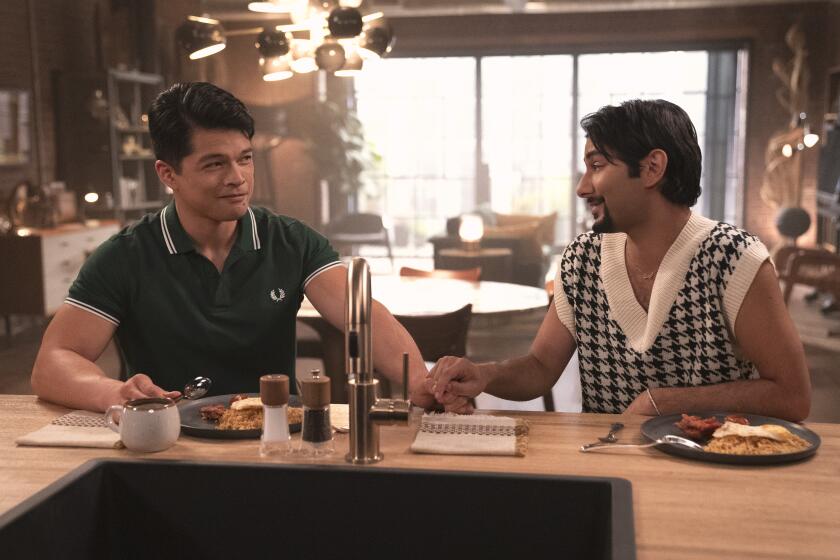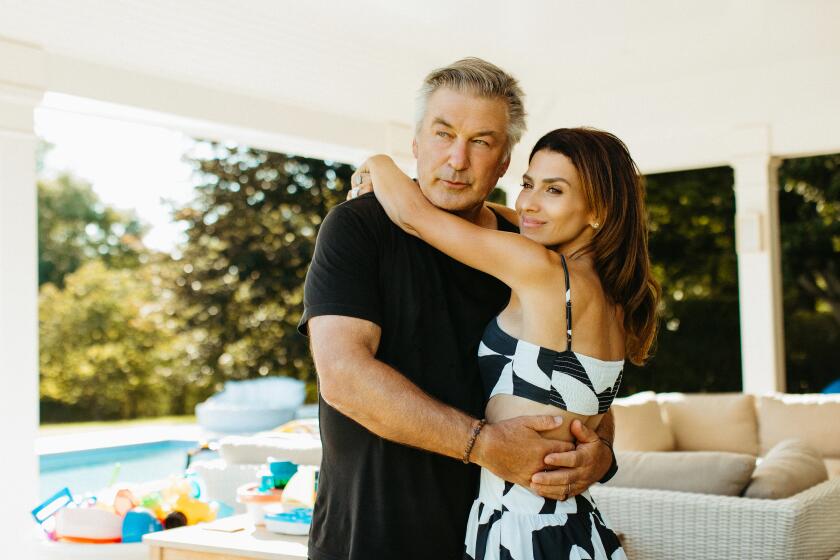Constance Marie, the star of ‘With Love,’ shows how people over 50 can be sexual beings
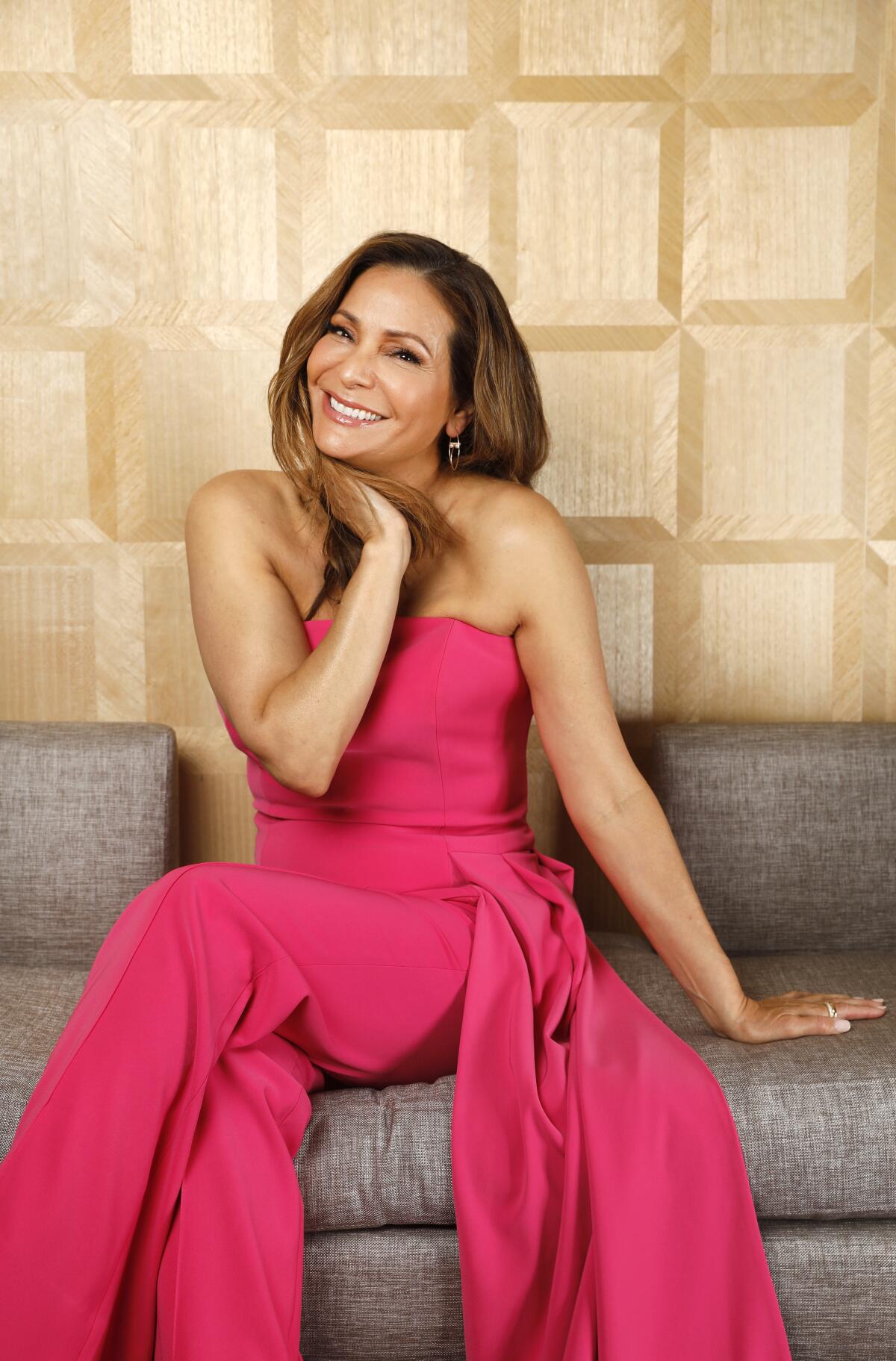
- Share via
If you didn’t already know Constance Marie from her role as the mother of late Tejano icon Selena Quintanilla-Pérez in the modern classic biopic “Selena,” you may have discovered her later as Angie Lopez, the supporting and level-headed wife and mother in the long-running ABC sitcom “The George Lopez Show.”
With a career spanning nearly four decades, Marie has remained a steady presence on film and TV, with roles in “Santa Barbara,” “American Family,” and “Mi Familia,” and in more recent fare like “Animal Kingdom,” “Lopez vs. Lopez” and “How I Met Your Father.” But it’s her turns as a mother that have left a lasting mark.
So the role of Beatriz Diaz in Prime Video’s “With Love” — in which her character struggles with her kids leaving the nest and her marriage falling into a rut, triggering a rediscovery of self — felt like a natural evolution to her matriarch oeuvre. The romantic comedy, from executive producer Gloria Calderón Kellett, returned for its second season on June 2.
For someone who was plucked from obscurity to valiantly dance alongside David Bowie on his Glass Spider Tour in the late ‘80s, Marie is self-effacing and reflective while speaking on a video call from her home in Los Angeles. She discussed her roots in the city, why she couldn’t finish Netflix’s “Selena: The Series,” and the fear of taking on a sex scene in her 50s. This interview has been edited for length and clarity.
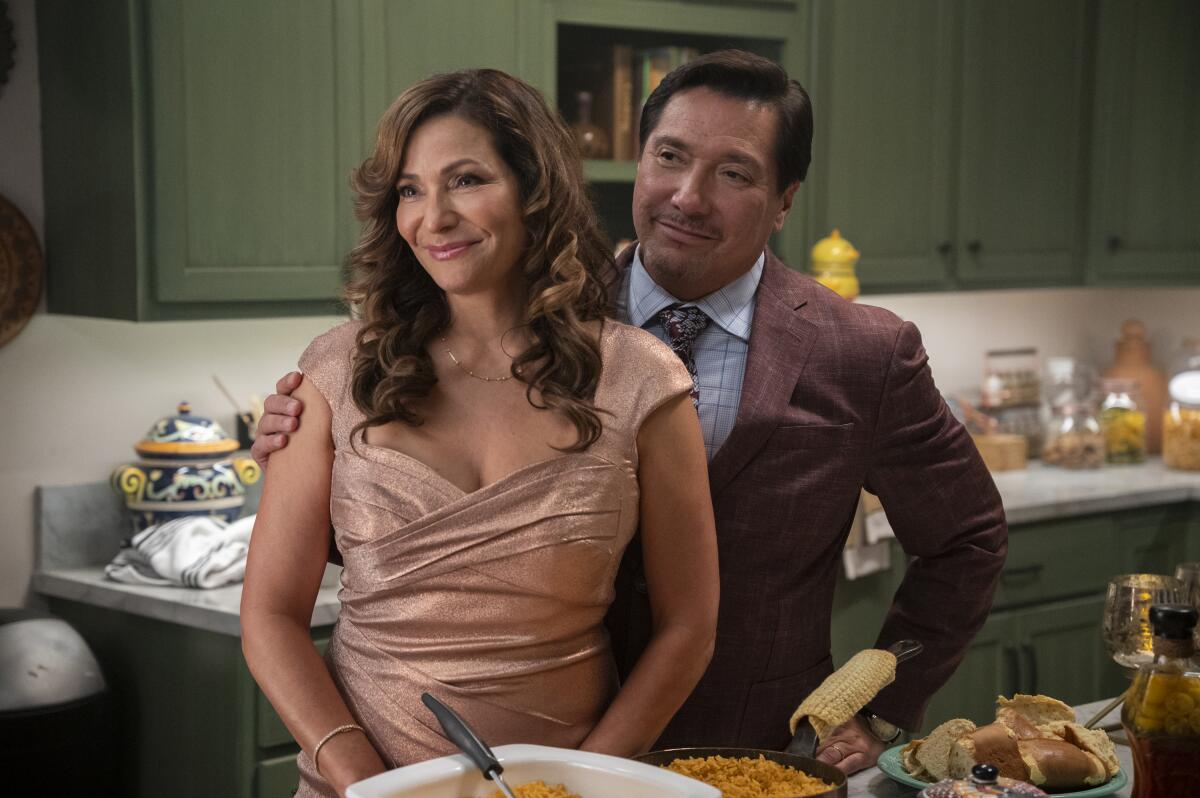
When we first meet Beatriz, she’s this wife and mother who’s struggling with her kids getting older and her marriage being on autopilot. What have you enjoyed about exploring that phase and dynamic of some women’s experience?
I’ve enjoyed the representation of it because there isn’t really any reflection of the quiet suffering that a woman in a long-term relationship experiences. I really feel, especially with Season 1, that a lot of women have identified with all the years where women focus on their children, and they focus on their husband, and they focus on the house, and she [Beatriz] has a business — and then she forgets herself. Each grain of sand just wears away with her sense of self. And for me, privately, I can also relate to it. I know friends who’ve gone through it. And the best part about the character is that it doesn’t go too far. It stays in that area where you’re able to still work on it. And if you pay attention to it, you can right the ship before it goes critically wrong or before somebody cheats, or something really, really bad happens.
‘With Love’ creator Gloria Calderón Kellett breaks down how four film classics, from “When Harry Met Sally” to “Elf,” that inspired her seasonal rom-com.
Did you recognize elements of Beatriz in your own mother? There’s something about looking at our mothers from above and seeing how they grapple with who they are outside of their kids and partners.
I think Latinas are the poster children for life transition. I did see a lot of that survivor quality in my mother. She was married in the ‘60s, divorced in the early ‘70s, lived part of the ‘70s as a single mom. I also come from a generation where it was a lot more reactionary. We weren’t Oprah-izing. Remember the aha moments? We were not really checking in that much with ourselves. So a lot of it was just survival instinct. I think that we just continue to evolve out of necessity. My mother did that. And I, as a human, have done that. And I’ve seen so many women, it’s not just Latinas, it could be any woman, we are constantly put into situations where we are forced to evolve — we sink or swim. And if we have kids, we always swim, we figure out a way to swim and to blossom and grow and transition.
Early into the first episode, the show features a scene where your adult daughter Lily [Emeraude Toubia] walks in on her parents during an intimate moment. What was your reaction when you read that in the script?
I had many reactions. The first one was like, “Oh, we’re going for a different tone this season ...” And then I was like, “Yes!” Then I was like, “Oh god, it’s me that has to do it.” This is my first time working with Gloria but I feel like this project and the cast we’re all — that name “With Love” is not necessarily just the title, it’s kind of how we approach everything. We have support, respect, and I thought “OK, well if I’m gonna do it with anybody, I’m glad it’s with Gloria Calderón Kellett because I’m totally nervous about this. I’m 58 in September. I have not been asked to be like the sexy cha-cha in decades. I don’t even know if I ever was. But yeah, I was terrified. It’s so important to show 50-year-olds having sex and being sexual beings and reclaiming their sexuality. And that’s just a normal part of life. You don’t just get put out to pasture.
And let’s just say they’re not in the missionary position.
The best thing about this show is that it’s very touching and authentic and truthful, but then it’s also funny. In my mind, I saw it as like this “Home Alone” moment. It was written that she sees us going at it. There was a videoconference, where Glo and I discuss it. And we’re just going, “OK, what if we do this?” I’m like, “Can you see that angle?” [demonstrates various positions] And then she’s like, “No, no, no. What if you ...?” And then she’s lifting up her skirt. It was always done with respect and humor and we really needed it to be right. Also I am 58 and was a dancer. We had to test out which position would not hurt me the most. We tried different spots on the bed. It was hilarious.
But once we got there on the day, and we figured out the angles, we knew what we were going for. I was so comfortable. And we have an intimacy coordinator there. But we have to sell it right, because I don’t want to be in this position all day. I had to turn around to Benito [Martinez, who plays Beatriz’s husband, Jorge Diaz] and be like, “Benito, when I move forward, you have to move forward.” We were trying to coordinate thrusts, I don’t want to spoil it, but the technique of it is, I had to boss him because we had to sell it. I was like, “You need to groan more.” He’s like, “OK.”
The new season arrives at such a significant moment. Writers are on strike and Gloria, who really hustles to bring attention to not only her work, but the work of others, can’t partake in the promotion of the show in the way that she normally would. What’s it been like navigating it as an actor?
It’s been awful. The timing of it is not great, but it’s been such a long time coming because writers, directors and actors, our contracts are based on an antiquated way of doing business. And for us to just make a living and sustain, we need to adapt. It’s necessary. It takes that [striking] in order to move the ball forward for us all. But it’s been really hard for me to watch her because this is her baby. I know she is going to make a difference in her lifetime. That’s how she lives her life every single day. And I am so proud and inspired to be in her orbit. So all of us have just said, “Glo, we will do whatever works to move this ball forward.”
As somebody of an underserved community, the Latinx community, we know what it’s like to have to fight. We’re fighting for representation, we’re fighting for these shows to succeed, we’re fighting for equal pay [and] we’re fighting for sustaining a career in a business model that is moving and evolving at lightning speed. We’re all part of this fight. Hopefully the writers’ strike gets solved because they’re fighting for the same things that the actors are fighting for, which the directors are fighting for.
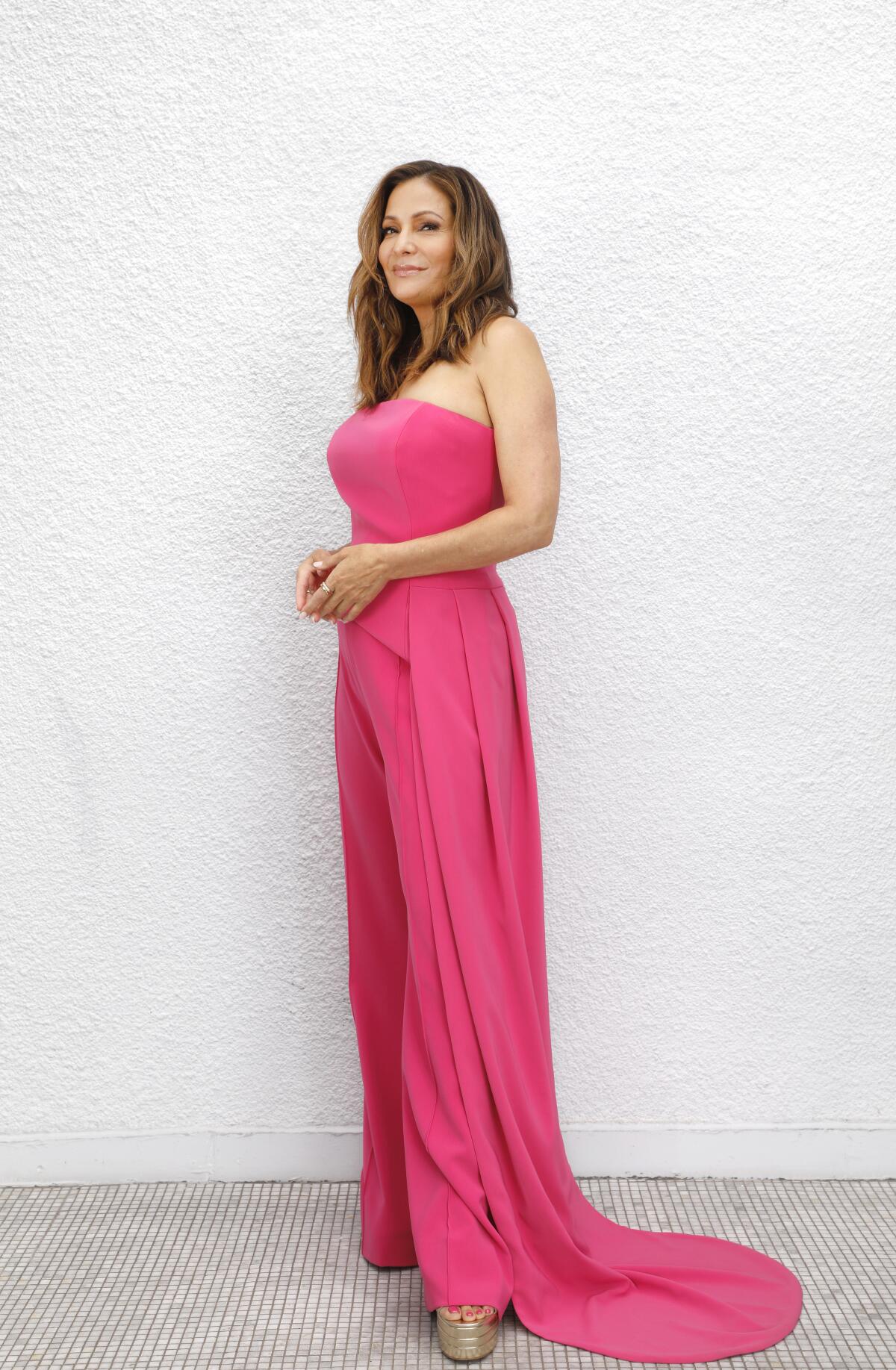
You’ve seen the changes happen. As creative people, we want to be focused on the art and not be bogged down by the business, but you also risk a lot in not paying attention. What have you learned in terms of what’s important to be mindful of when it comes to working in Hollywood?
It’s very complicated and I’ve been doing it for 35 years. What I have seen is that the struggle pays off. But sometimes struggle is part of it. I come from a time when there was a great brownwashing in Hollywood. Like for me, I was very close to getting a role on “Zorro” and instead it’s Catherine Zeta-Jones who gets the role and it turns her into a star. God bless her, we’re all trying to survive, but when it’s even Latin stories and you’re not allowed to even play those roles, it goes to Anjelica Huston or Marisa Tomei or, now, we have the James Franco controversy [he was cast as Cuban dictator Fidel Castro in a forthcoming film]. I come from way back then, when nobody wanted to hear from you. I was focused on the big picture, but to make a living. If we can’t sustain a career, then there’s no representation.
When I did “The George Lopez Show,” I remember doing an interview for CNN and they were like, “So what’s it like to represent the entire Latino community?” And I thought, “Oh my God.” I didn’t really realize because I was so focused on the work, but I’ve been blessed with the mantle. I’ve been able to work long enough that people ask me that question. And then I realized, “Oh, I guess, because there’s nobody else standing next to me, other than George or the people that are there to show that I’m on, I need to be serious about this.”
I remember the strike we had before. I know what it’s like to be a working actor where you can’t make a living and if you give up, if I give up, then who inspires the future generation? I’ve wanted to give up several times and Tony Plana [the Cuban American actor and director] was the one who stopped me at the end of a very horrible audition, where I knew I was too old to play one part and too young to play another part, for “Resurrection Blvd.” I remember thinking, “I need to make a living. I cannot bounce between Latinos when they’re hot and when we’re not.” And Tony Plana said to me, and I didn’t even know him that well: “Constance, you cannot quit.” And I was like, “Tony, nobody wants me.” And he said, “If you quit, and somebody else has to start all over from the beginning to get to where you are. We need you.” And I realized, well, it’s about more than just me. It’s about future generations, it’s about educating people who don’t know anything about our community. It’s about inspiring young girls.If somebody can stand on my shoulders from what I’ve been able to accomplish over 35 years, and that makes it a little bit easier for them, then just stand on here and I will help you get to the next level. And that’s why I don’t quit.
I didn’t know this about you until preparing for this interview. You were spotted at a club by a choreographer and then were hired to go on tour with David Bowie?
Yes, by Toni Basil, who did “Oh, Mickey, you’re so fine. You’re so fine, you blow my mind” [“Hey, Mickey”]. She asked me if I wanted to audition with a bunch of other street dancers. There were no hip-hop classes, we were it in underground clubs. The greatest thing about poverty and desperation and economic insecurity is it pushes you to say yes to things that you have no idea that you’re qualified to do and you just do them. I auditioned. I got the job and I got to meet Bowie and I toured around the world. I went to Europe, I went to New Zealand. I just saw life could be huge and big. I met Princess Diana, I had dinner with Bono and it just opened my world in such a giant, giant way and I thought, “Oh yeah, I want more of this please. This is beautiful.” I never felt like I was a good enough dancer because I learned it on the streets. I had no training, but I knew how to do a style of dance that nobody else knew how to do. So they would just go “OK, Constance: Go!” and I’d do my locking and popping.
In an effort to increase the pressure on studios to come to an agreement with the Writers Guild of America, some showrunners have chosen to stop publicity work for their series.
Your first film was as a teenager —
I think it was “Back to the Beach” [1987] with Annette Funicello and Frankie Avalon and Pee-wee Herman [Paul Reubens]. I was a dancer.
You’ve said you never thought of yourself as becoming an actor, so how did it happen?
I didn’t ever think of myself as good at much. But one thing that has been a constant in my life is that I’ve always danced. And my mom tells a story, which I think is a total lie, but I will repeat it, because it kind of is an origin story: I was in the baby crib and my mom was a huge listener of loud music while she cleaned, and I would bounce to the beat, but for the whole song. I never lost the beat, I would stay in there.
Dancing was my anchor. When I was stressed, I’d go dancing. If I was feeling great, I would dance. When I was studying in college, my dance friends would go, “Oh, there’s an audition for a dance thing. You should try it!” I’d be like, “OK, it’s summer. Fine. I’ll go,” and then I would get the job. I would always think to myself, “OK, I don’t want to be starving artist. But if I never tried [acting], I would always think ‘what if?’ I don’t want to be a 40-year-old woman who never tried.” So I tried. And I loved it.
I remember the first time, in that movie “Back to the Beach,” that I discovered catering. They would have a truck and I ate fish for the first time. It was orange roughy. And I remember they loaded up my plate. It was this gourmet meal. I had never seen a meal like this before. And I was in I was like, “How much is this?” And they said, “Oh, no, this is free.” And I thought, “this is free?” I was like, “I love this job! And they’re paying me to do it and all I have to do is dance?” My bar was really, really low.
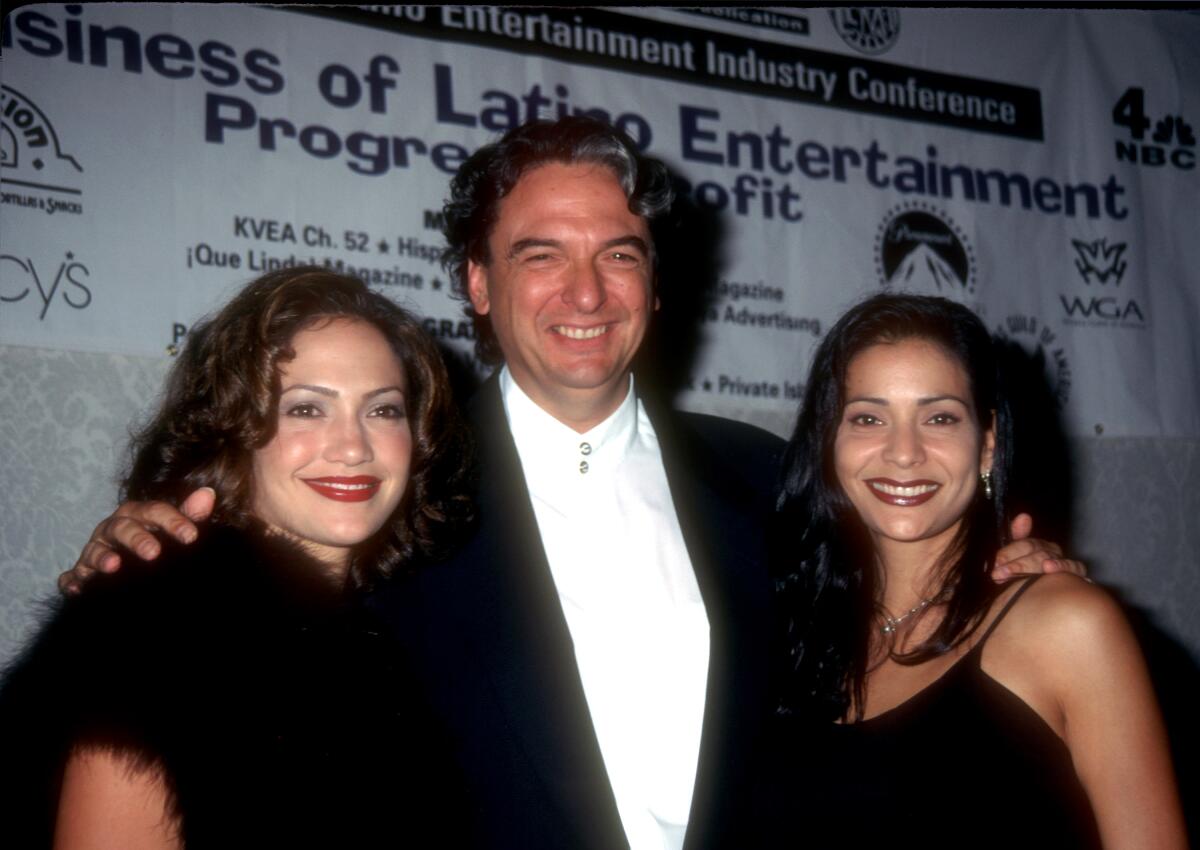
At this point in your career, I’m sure you’ve talked endlessly about “Selena” and how you were famously tested alongside Jennifer Lopez to play Selena before they cast you as her mother. What do you remember about it?
I remember seeing Seidy López, Jennifer Lopez and this other young girl who looked exactly like Selena. I did not know Selena because I grew up in West Hollywood, not speaking Spanish. But I remember the research because to test you, I had to discover her. I had to watch tapes of her. I had to listen to the songs. I had to learn everything. I had a really profound sad moment when I was watching her in my living room doing “Como la Flor” and the dance moves I had to copy — I was discovering her and mourning her at the same time. I had this weird moment where I was so into it and having a great time and then it hit me that she had died. I just started crying. It was the accelerated version of being a Selena fan.
I know that one of her dreams was to sing in English, her native tongue, and I thought to myself, “If I can just be a little tiny part of this movie to help her fulfill her dream — because ‘Dreaming of You’ was just going to be released — I thought, well, I’ll play whoever.” When I didn’t get it, Gregory Nava [the film’s writer and director] brought me into an office and said, “I just want to let you know you did not get the role of Selena, but would you be interested in playing the role of the mother?” I thought to myself, especially with Latin moms, no matter how old you are, you’re their baby; they treat you like a baby and they love you like the baby. So I thought, “So what that Jennifer’s only two years younger than me. Just treat her like a baby.”
Did you watch the Netflix series?
I think I watched one episode of it because I wanted to see Seidy [López as Selena’s mother Marcela] do it. It was hard because we did our movie within the year of her passing and I met everybody. Selena’s mom [Marcela], in particular, was very ... she didn’t want to meet me. Everybody else got to meet the people that they were playing in real life. She did not want to meet me because she didn’t want to live any of it and I totally respected that. In the end, we did meet and it was really a blessing and difficult. I only ever watched the movie twice. The first time was at a screening.
The complete guide to home viewing
Get Screen Gab for everything about the TV shows and streaming movies everyone’s talking about.
You may occasionally receive promotional content from the Los Angeles Times.
Only twice?
Yeah. Because as a mother now [voice breaks], it was too horrible a story. I remember having to rush out of the screening because I witnessed Selena’s mom’s pain. She would tell me these wonderful stories about Selena, and then she would catch her breath in the middle and then realize that she had passed in the middle of telling the story. Witnessing that, and living that, and seeing all of it, I couldn’t watch the movie. I watched it the first time and I ran into a room at Warner Bros. and I cried. I just couldn’t let anybody see me. During the premiere, I didn’t watch, I left. During COVID, I watched it with my daughter for a second time.
What was that experience like?
It was beautiful and profound. And I did still get a little bit upset and she was like, “Mom?” And I was like, “Yeah, sweetie, it was just a hard movie”; it was a hard thing that happened in life and it was a hard thing to portray and I’m so proud of it. And I’m so glad that it’s lasted so long and Selena’s dream was fulfilled but it came at a horrible price.
It just struck me as you were talking, you’ve given us so many deep and meaningful and nuanced portrayals of mothers, of Latina mothers.
I remember playing mothers before I was a mother. I played Selena’s mom before I was a mom. And now that I am a mom, I feel like, “Oh, I was such a hack back then.” Now, I really know. It’s the biggest gift to me to somehow be in that box. It’s not even a box, it’s like a place of respect. I always thought playing a mom was a good thing, I never thought it was a bad thing because moms are so important. I did this project for Amazon [Prime], “Undone,” and my [14-year-old] daughter is actually in it. One of the greatest quotes that one of the producers told me was that I was the Florence Henderson of the Latino community. They didn’t come up with that, somebody told them that in an interview that one of our producers had done and I thought, if I get to be the Florence Henderson of the Latino community, I’m so blessed.” That’s the biggest compliment I could ever receive.
More to Read
The complete guide to home viewing
Get Screen Gab for everything about the TV shows and streaming movies everyone’s talking about.
You may occasionally receive promotional content from the Los Angeles Times.
